Rheumatology Course
For Graduates and Family Physicians
by
Dr. Mahabaleshwar Mamadapur
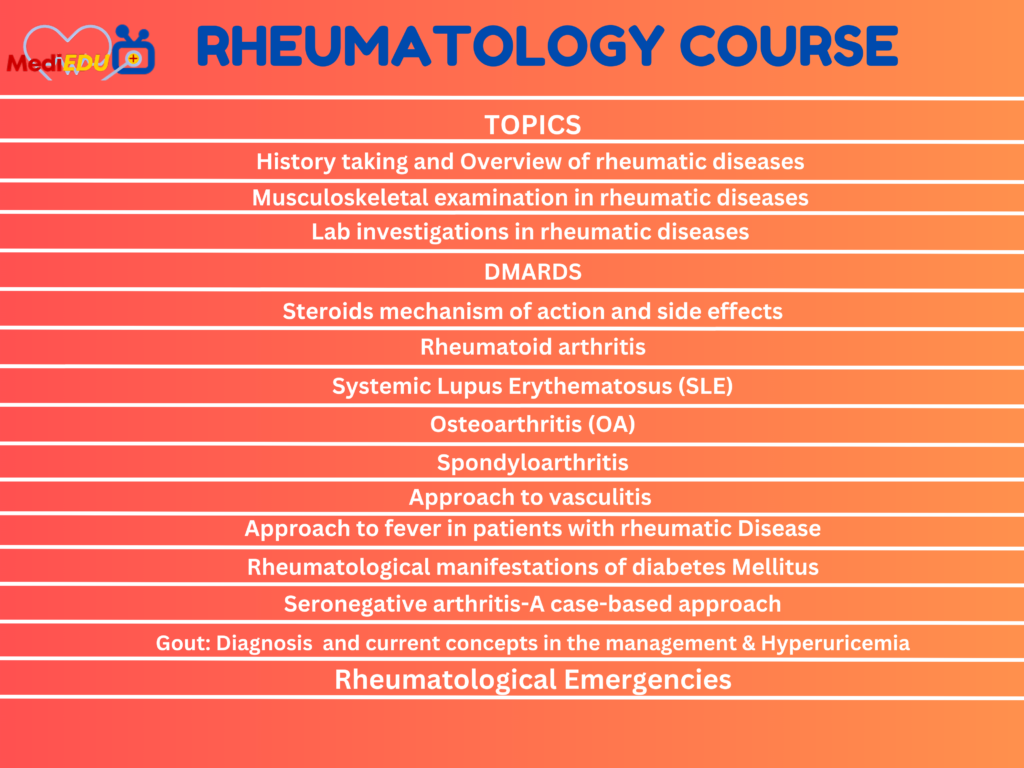
History Taking and Rheumatic Disease
Musculoskeletal Examination in Rheumatic Disease
RHEUMATOLOGY COURSE, Lecture-6: Rheumatoid arthritis by Dr. Mahabaleshwar Mamadapur
RHEUMATOLOGY COURSE, Lecture-7: Systemic Lupus Erythematosus (SLE) by Dr. Mahabaleshwar Mamadapur
RHEUMATOLOGY COURSE, Lecture-8: Osteoarthritis by Dr. Mahabaleshwar Mamadapur
RHEUMATOLOGY COURSE, Lecture-9: Spondyloarthritis by Dr. Mahabaleshwar Mamadapur
Rheumatology Course, Lecture-10: Approach to Vasculitis by Dr. Mahabaleshwar Mamadapur
Rheumatology course, Lecture-15: Rheumatological Emergencies by Dr. Mahabaleshwar Mamadapur
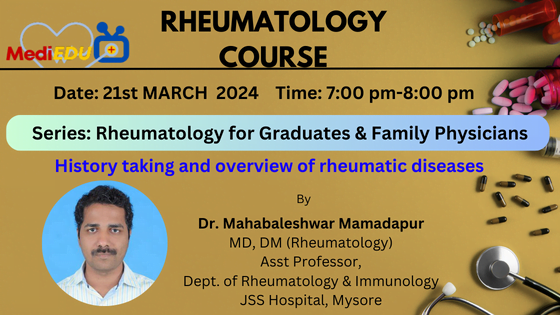
History Taking & Rheumatic Diseases
This program emphasizes the importance of understanding a patient's medical background, symptoms, treatments, and disease progression in providing personalized care.
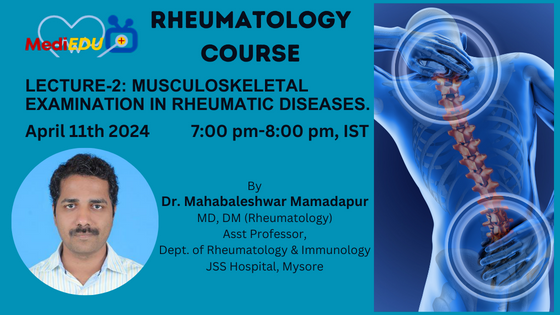
Musculoskeletal examination in rheumatic disease
The teaching program on ‘Musculoskeletal examination in rheumatic disease’ is designed to provide a comprehensive understanding of evaluating and diagnosing rheumatic conditions affecting the musculoskeletal system.
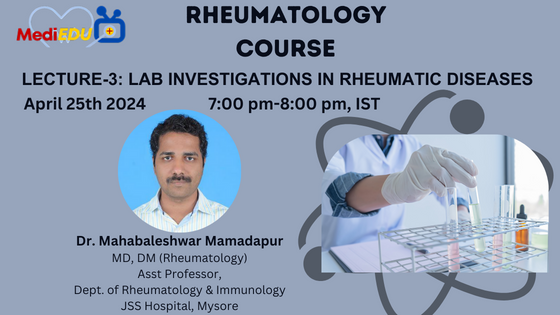
RHEUMATOLOGY COURSE, Lecture-3: Lab Investigations in Rheumatic Diseases By Dr. Mahabaleshwar Mamadapur
The teaching program on lab investigations in rheumatic diseases aims to provide a comprehensive understanding of the laboratory tests commonly used in diagnosing and managing rheumatic conditions.
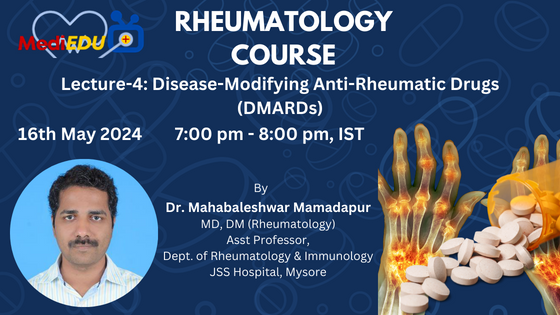
RHEUMATOLOGY COURSE, Lecture-4: Disease-Modifying Anti-Rheumatic Drugs (DMARDs) By Dr. Mahabaleshwar Mamadapur
The session covers the role of DMARDs in treating rheumatic diseases, including their mechanisms of action, types, clinical applications, and monitoring. Emphasis is placed on understanding how DMARDs modify disease progression and improve patient outcomes.
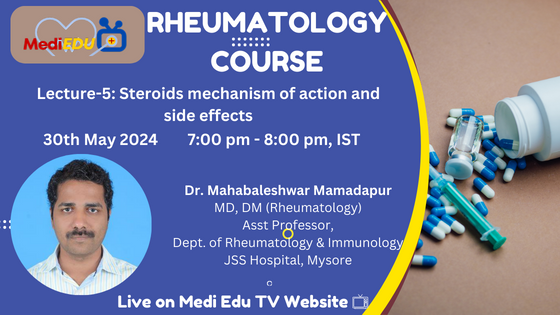
RHEUMATOLOGY COURSE, Lecture-5: Steroids mechanism of action and side effects by Dr. Mahabaleshwar Mamadapur
This teaching program explores the therapeutic effects of steroids by modulating immune responses and inflammation pathways. The session will also cover the spectrum of potential side effects that can arise from steroid use, including metabolic changes, bone density loss, and immune suppression. Emphasis will be placed on understanding
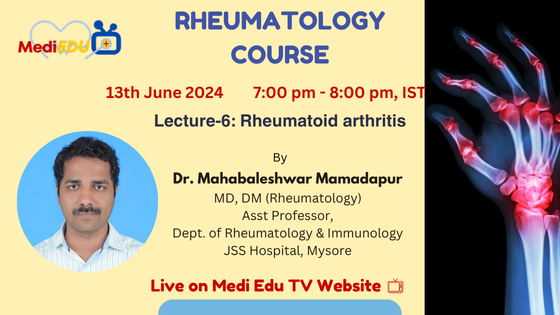
RHEUMATOLOGY COURSE, Lecture-6: Rheumatoid arthritis by Dr. Mahabaleshwar Mamadapur
This lecture provides an overview of rheumatoid arthritis, a chronic autoimmune disease characterized by joint inflammation and systemic involvement. Students will learn about the pathophysiology, clinical features, diagnostic criteria, and treatment options for RA, emphasizing early detection and comprehensive management to improve patient outcomes.
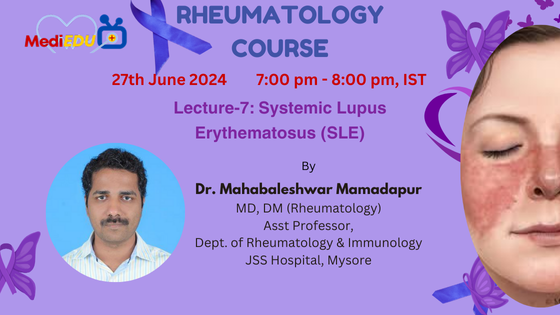
RHEUMATOLOGY COURSE, Lecture-7: Systemic Lupus Erythematosus (SLE) by Dr. Mahabaleshwar Mamadapur
This lecture introduces systemic lupus erythematosus, a complex autoimmune disorder affecting multiple organs and systems. Students will explore the etiology, clinical manifestations, diagnostic approaches, and treatment strategies for SLE, emphasizing the importance of interdisciplinary care and patient education in managing this heterogeneous disease.

RHEUMATOLOGY COURSE, Lecture-8: Osteoarthritis by Dr. Mahabaleshwar Mamadapur
Osteoarthritis is a degenerative joint disease characterized by the breakdown of cartilage in joints and underlying bone changes. This lecture will explore the pathophysiology, clinical manifestations, risk factors, and management strategies for OA, focusing on its prevalence, impact, and current therapeutic approaches in clinical practice.

RHEUMATOLOGY COURSE, Lecture-9: Spondyloarthritis by Dr. Mahabaleshwar Mamadapur
Spondyloarthritis refers to a group of inflammatory rheumatic diseases that primarily affect the spine and peripheral joints. This lecture will cover the various subtypes of SpA, including ankylosing spondylitis and psoriatic arthritis, emphasizing their clinical features, diagnostic criteria, genetic predispositions, and treatment options. Students will gain insights into the evolving
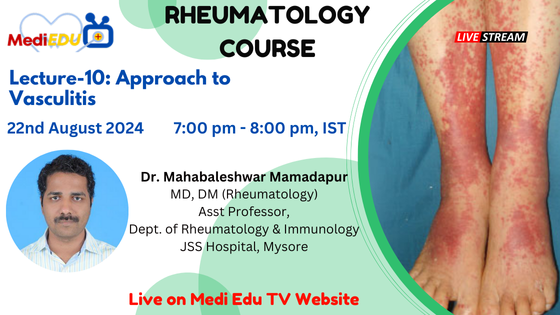
Rheumatology Course, Lecture-10: Approach to Vasculitis by Dr. Mahabaleshwar Mamadapur
This lecture will provide an overview of vasculitis, focusing on its classification, etiology, and pathophysiology. The speaker will discuss the clinical manifestations and diagnostic approaches for various types of vasculitis, emphasizing the importance of timely recognition and intervention. Students will gain insights into the management strategies for vasculitis, equipping them with the necessary skills for future clinical practice.
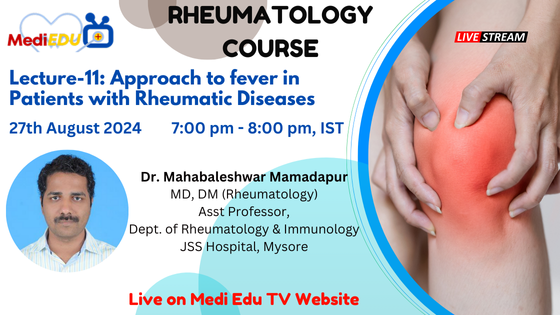
Rheumatology Course, Lecture-11: Approach to fever in Patients with Rheumatic Diseases by Dr. Mahabaleshwar Mamadapur
This lecture will focus on the evaluation and management of fever in patients with rheumatic diseases. It will explore the differential diagnosis of fever in this patient population, considering both infectious and non-infectious causes. The session will cover the pathophysiology of fever, how it relates to rheumatic conditions and the significance of fever in disease activity and treatment responses.
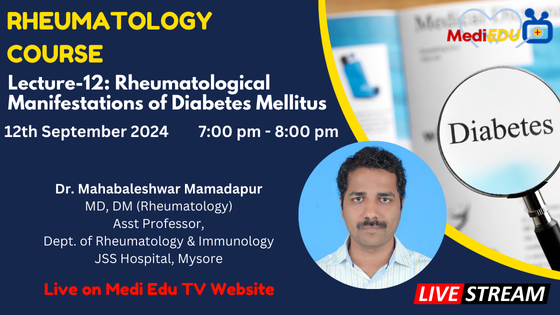
Rheumatology Course, Lecture-12: Rheumatological Manifestations of Diabetes Mellitus by Dr. Mahabaleshwar Mamadapur
This session will explore the various musculoskeletal and joint-related complications associated with diabetes mellitus. It will discuss common conditions such as diabetic cheiroarthropathy, Charcot joint, and diffuse idiopathic skeletal hyperostosis (DISH), focusing on their clinical presentation, pathophysiology, and management. The session aims to provide an integrated understanding of how diabetes can impact the musculoskeletal system, enhancing students' knowledge of the broader effects of this chronic disease.
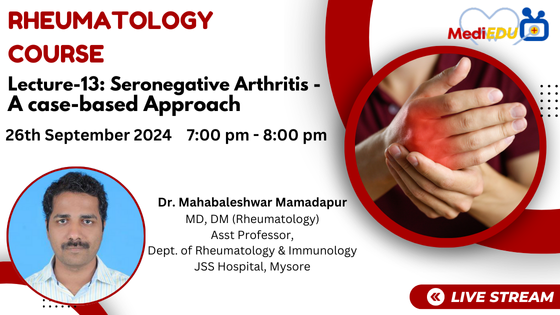
Rheumatology Course, Lecture-13: Seronegative Arthritis - A case-based Approach by Dr. Mahabaleshwar Mamadapur
This session will explore the diagnosis and management of seronegative arthritis through interactive case discussions. Students will learn to identify key clinical features, differentiate between types of seronegative arthritis, and understand the role of imaging and laboratory findings in diagnosis. The case-based format will highlight real-world challenges and decision-making in patient care, emphasizing a practical approach to treatment strategies.
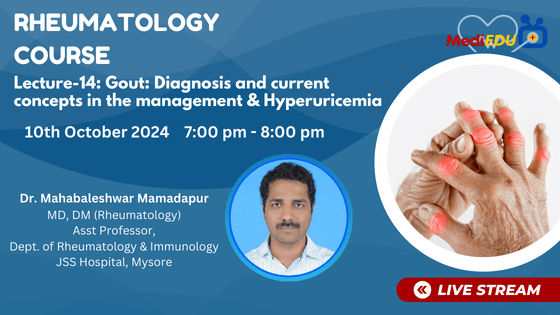
RHEUMATOLOGY COURSE, Lecture-14: Gout: Diagnosis and current concepts in the management & Hyperuricemia by Dr. Mahabaleshwar Mamadapur
This session will cover the relationship between gout and hyperuricemia, focusing on their pathophysiology, clinical presentation, and diagnostic criteria. Students will learn about management strategies, including lifestyle changes and pharmacological treatments, while also discussing recent advancements in the field. The aim is to equip students with practical knowledge for effective patient care in clinical settings.

Rheumatology course, Lecture-15: Rheumatological Emergencies by Dr. Mahabaleshwar Mamadapur
This session will explore critical rheumatological emergencies, emphasizing their clinical recognition and immediate management. Students will learn to identify conditions such as acute flares of systemic lupus erythematosus, septic arthritis, and severe vasculitis. The discussion will include diagnostic approaches, treatment options, and the importance of timely intervention to prevent morbidity and mortality. This knowledge is essential for effective decision-making in urgent clinical scenarios.